Kochava, an Idaho-based data broker company was sued by the US government for selling data collected from millions of phone devices. The data mainly included Geo locations and other location-sensitive information. The lawsuit was filed by the Federal Trade Commission(FTC), an organization responsible for consumer protection.
FTC reported that the data was used to track several people and their specific locations. The most targeted Geo locations from people’s devices involved health care institutions such as reproductive health, rehabilitation centres for addiction, Mental health counselling services, shelters for abuse victims or homeless people, etc.

Kochava was an online subscription-based company where clients would need to pay $25,000 to get access to “confidential” Geo-location data. The Idaho data company worked via online data marketplaces. It was also reported that the company even gave free data samples until June 2022.
The company used Amazon Web services (AWS) as its main online marketplace as according to them the online platform helped their goal to provide Geo data from billions of mobile devices. The Idaho data provided often included location feed with the longitude/latitude raw numbers. The Geo transactions went up to 94B+ monthly, the data broker company had 125 monthly users out of which daily active users tallied up to 35 million. More than 90 daily transactions happened on average on a single user’s device.
FTC alleged the Idaho data broker company was selling data that could be used in malicious ways. The company would be enabling the practice of stalking, doxxing, discrimination, and exposing several thousand people to physical violence, threats over leaking private information, etc. The company boasts of identifying home locations as possible use of their services in some of their advertising materials.
FTC plans to halt any sale or activity of Kochava and delete the sensitive geo data it had previously collected. According to the agency, there would be terrible consequences if the data is still permitted online for selling or for anyone to get the free samples. As previously mentioned, the availability of geo location data publicly which has been used to track locations of people seeking health care, could be disastrous for people looking for abortion centres in the eight US states with restricting laws after the Roe Wade turnover.
Kochava insistence

Idaho data broker company also filed a case
Kochava also filed a case against FTC on 12 August for overreaching their claims when the case was first filed by FTC last month. In a press release, Kochava claims that it will make the function “Privacy block” available to its users which will ban locations of healthcare facilities/services from its collective marketplace. The broker company had hoped that this privacy block would resolve the issues FTC had with their shady organization.
Earlier FTC also announced that they will be imposing heavy rules on businesses behind mass commercial surveillance where private information is collected from their consumers to be analyzed and then monetized by the company.
In July, FTC declared it will enforce laws on businesses if they illegally share or distribute sensitive information like health data from consumers.
The FTC director Samuel Levine said that consumers’ private information about where they seek out health care and receive help or counselling should not be monetized by data companies. FTC is taking Kochava to court to protect a common’s man’s right to privacy.
In today’s time selling consumer data to the highest bidder has become a norm for big conglomerates, the biggest criminal of illegally selling private information for monetary purposes is Meta. Even if Consumers are aware not to share their sensitive information, private companies have the practice to track their online activity to collect data on their interests to sell it to advertising companies. This cycle is vicious and should be stopped. Big tech conglomerates have been violating the rights of privacy since a long time and they do that without any consequences. It is high time that governments start to push back against these conglomerates.













